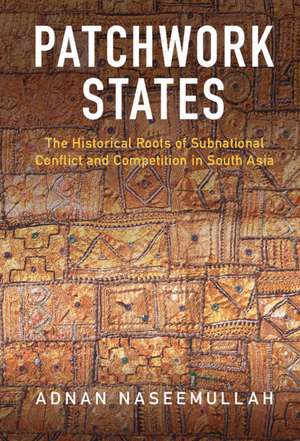Patchwork States: The Historical Roots of Subnational Conflict and Competition in South Asia
Autor Adnan Naseemullahen Limba Engleză Paperback – 22 iun 2022
| Toate formatele și edițiile | Preț | Express |
|---|---|---|
| Paperback (1) | 238.08 lei 6-8 săpt. | |
| Cambridge University Press – 22 iun 2022 | 238.08 lei 6-8 săpt. | |
| Hardback (1) | 638.47 lei 6-8 săpt. | |
| Cambridge University Press – 22 iun 2022 | 638.47 lei 6-8 săpt. |
Preț: 238.08 lei
Nou
Puncte Express: 357
Preț estimativ în valută:
45.60€ • 46.98$ • 38.20£
45.60€ • 46.98$ • 38.20£
Carte tipărită la comandă
Livrare economică 22 februarie-08 martie
Preluare comenzi: 021 569.72.76
Specificații
ISBN-13: 9781009158411
ISBN-10: 1009158414
Pagini: 280
Dimensiuni: 151 x 228 x 21 mm
Greutate: 0.48 kg
Ediția:Nouă
Editura: Cambridge University Press
Colecția Cambridge University Press
Locul publicării:New York, United States
ISBN-10: 1009158414
Pagini: 280
Dimensiuni: 151 x 228 x 21 mm
Greutate: 0.48 kg
Ediția:Nouă
Editura: Cambridge University Press
Colecția Cambridge University Press
Locul publicării:New York, United States
Cuprins
Part I. Framework; 1. Introduction; 2. Political Order State Formation, and Typologizing Colonial Rule; Part II. Historical Roots; 3. The Making of Patchwork Authority; 4. The Patchwork Nature of Colonial Governance; 5. Post-Colonial Patchwork States; Part III. Contemporary Consequences; 6. Patchwork States and Sovereignty: Explaining Political Violence; 7. Patchwork States and Patronage: Explaining Electoral Competition; 8. Patchwork States and Development; Part IV. Conclusions; 9. Researching the Legacies of Colonial Rule; 10. Patchwork States in Comparative Perspective.
Recenzii
'This remarkable book sets the agenda for a new comparative politics focused on the territorially uneven causes and consequences of colonial state penetration and state-building within countries, and across regions such as South Asia (here, India, Pakistan, and Bangladesh). Naseemullah integrates three distinct stands in the study comparative politics and political economy of development - violence, electoral competition, and economic development - showing that institutional differentiation traceable to colonial rule goes far in explaining territorial variation in the outcomes that have been the focus of scholars for decades. An overarching explanatory framework makes it possible to ask a host of new questions about the contours and determinants of cross- and subnational variation in patterns of political and economic development. It is groundbreaking work that lays out a research design, hypotheses, and theoretical insights that can travel far beyond South Asia.' Catherine Boone, Professor of Comparative Politics, London School of Economics
'Patchwork States is an extremely stimulating analysis of the causal relations between various patterns of state building, harkening back to the colonial era in South Asia, and contemporary forms of violence, political competition and economic development. Naseemullah's fascinating book disaggregates the trajectories of India, Pakistan and Bangladesh at the sub-national level in a very holistic manner: a comparative tour de force.' Christophe Jaffrelot, Centre de Recherches Internationales, Sciences Po, Paris
'Patchwork States is an extremely stimulating analysis of the causal relations between various patterns of state building, harkening back to the colonial era in South Asia, and contemporary forms of violence, political competition and economic development. Naseemullah's fascinating book disaggregates the trajectories of India, Pakistan and Bangladesh at the sub-national level in a very holistic manner: a comparative tour de force.' Christophe Jaffrelot, Centre de Recherches Internationales, Sciences Po, Paris
Notă biografică
Descriere
Patchwork States argues that patterns of political violence in South Asia are rooted in state-building during and after colonial rule.
